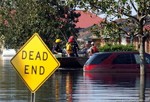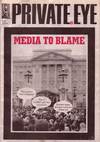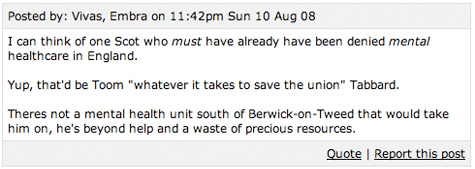 Wonkette compares McCain/Palin to J Howard Marshall/Anna Nicole Smith. So inappropriate. Yet so funny. Please accept my apologies in advance.
Wonkette compares McCain/Palin to J Howard Marshall/Anna Nicole Smith. So inappropriate. Yet so funny. Please accept my apologies in advance.August 2008 Archives
 Wonkette compares McCain/Palin to J Howard Marshall/Anna Nicole Smith. So inappropriate. Yet so funny. Please accept my apologies in advance.
Wonkette compares McCain/Palin to J Howard Marshall/Anna Nicole Smith. So inappropriate. Yet so funny. Please accept my apologies in advance. Commentary on Darling's Guardian interview has largely (and rightly) focused on his view that the economic times faced are "arguably the worst they've been in 60 years". Faced, note: he's not talking about the current economic situation, he's talking about where it's going. The current difficulties don't look worse than the early 80s or the early 90s yet. But where is it going?
Commentary on Darling's Guardian interview has largely (and rightly) focused on his view that the economic times faced are "arguably the worst they've been in 60 years". Faced, note: he's not talking about the current economic situation, he's talking about where it's going. The current difficulties don't look worse than the early 80s or the early 90s yet. But where is it going? Everyone's very excited about McCain's VP pick, Alaska's Iron Lady (left). Fair play, it's sucked the oxygen of publicity away from Obama's convention as planned.
Everyone's very excited about McCain's VP pick, Alaska's Iron Lady (left). Fair play, it's sucked the oxygen of publicity away from Obama's convention as planned.  The news that a category 3 hurricane called Gustav could hit New Orleans this week is alarming local residents.
The news that a category 3 hurricane called Gustav could hit New Orleans this week is alarming local residents.  Patrick's been urging me to watch Tavish Scott's appearance on Newsnight last night. Having done a substantial u-turn on a referendum in his first 24 hours in office, Tavish then refused to answer Gordon Brewer's question. After berating the media, which is always a good idea. (iPlayer link, until it goes down)
Patrick's been urging me to watch Tavish Scott's appearance on Newsnight last night. Having done a substantial u-turn on a referendum in his first 24 hours in office, Tavish then refused to answer Gordon Brewer's question. After berating the media, which is always a good idea. (iPlayer link, until it goes down) A week on Saturday the World Cup circus resumes, and Scotland are playing away in Macedonia, kicking off the European section.
A week on Saturday the World Cup circus resumes, and Scotland are playing away in Macedonia, kicking off the European section.  Andrew Berry, a trade unionist from London and Labour member, recently attended a Scottish Labour leadership hustings, and I recommend his review. Here are some unedited highlights.
Andrew Berry, a trade unionist from London and Labour member, recently attended a Scottish Labour leadership hustings, and I recommend his review. Here are some unedited highlights. Edinburgh Council's Development Committee today discussed Caltongate again, and duly ignored both UNESCO and the Scottish Green Party. At least we're in good company.
Edinburgh Council's Development Committee today discussed Caltongate again, and duly ignored both UNESCO and the Scottish Green Party. At least we're in good company.  The bus brought Scotland's successful Olympic medal winners down past Parliament today, and everyone was there, the Save Meadowbank protesters, the general public who took Save Meadowbank placards in large numbers, the media, and politicians like Tavish Scott, whose Liberal colleagues in Edinburgh are behind the demolition alongside their SNP partners.
The bus brought Scotland's successful Olympic medal winners down past Parliament today, and everyone was there, the Save Meadowbank protesters, the general public who took Save Meadowbank placards in large numbers, the media, and politicians like Tavish Scott, whose Liberal colleagues in Edinburgh are behind the demolition alongside their SNP partners. Not as a First Minister, mind, as an ex-First Minister. Some people leave the top job and fester on the back benches, scheming and briefing against their successors. Others openly declare themselves to be back-seat drivers.
Not as a First Minister, mind, as an ex-First Minister. Some people leave the top job and fester on the back benches, scheming and briefing against their successors. Others openly declare themselves to be back-seat drivers.  You can't argue with the man's mandate - 59% for Scott, 21% for Finnie, and 18% for Rumbles. The missing 2% presumably voted for Charlie Kennedy. Or were illegible. Or both.
You can't argue with the man's mandate - 59% for Scott, 21% for Finnie, and 18% for Rumbles. The missing 2% presumably voted for Charlie Kennedy. Or were illegible. Or both. There's no excuse. Greenpeace have done a report (1.7Mb pdf) on Britain's tuna-eating habits, and it's truly appalling.
There's no excuse. Greenpeace have done a report (1.7Mb pdf) on Britain's tuna-eating habits, and it's truly appalling. - The UK is the second biggest tuna market in the world, consuming 700 million tins in 2006.
- There are twenty-three tuna populations in the world, and nine are fully fished, four are over-exploited, three are critically endangered, three merely endangered, and three are vulnerable to extinction.
- 90% of the global population of predatory fish (like tuna and shark) has already been wiped out.
- The use of long lines in the Pacific is one of the factors behind a 95% loss of leatherback turtles over the last three decades.
- Between half a million and 1.4 million sharks die on long lines in the Western Pacific alone.
- For every thousand tonnes of tuna caught in so-called Fish Aggregation Devices, one hundred and eleven thousand other animals were caught, including sharks, rays, marlins and sea turtles.
 I had a feeling this was coming my way. Iain Dale started a "where were you when?" game of tag, he tagged Tom Harris, he tagged STB, and here we are.
I had a feeling this was coming my way. Iain Dale started a "where were you when?" game of tag, he tagged Tom Harris, he tagged STB, and here we are. Last week, at John Macdougall's funeral, Labour high heidyins mingled with his family.
Last week, at John Macdougall's funeral, Labour high heidyins mingled with his family.  The Independent reports today that the firm which lost personal data for 84,000 convicted criminals is also lined up to work on the ID cards. This scheme is destined to fail or be scrapped, so the £33m they've been paid will be wasted no matter what, but if I had my way every company that ever fails on personal security should be blocked from any future Government IT contracts.
The Independent reports today that the firm which lost personal data for 84,000 convicted criminals is also lined up to work on the ID cards. This scheme is destined to fail or be scrapped, so the £33m they've been paid will be wasted no matter what, but if I had my way every company that ever fails on personal security should be blocked from any future Government IT contracts. Rumours of shifting Liberal opinion started spreading earlier this month, with Tavish Scott being described as high-handed, furious with Ross Finnie for even standing, and offering no progress on their current situation. Mike Rumbles remains the outsider's outsider, but Finnie looked like a good bet.
Rumours of shifting Liberal opinion started spreading earlier this month, with Tavish Scott being described as high-handed, furious with Ross Finnie for even standing, and offering no progress on their current situation. Mike Rumbles remains the outsider's outsider, but Finnie looked like a good bet.  Hey Obama, you promised me I'd be the first to know your VP. How come I read it's Joe Biden on the BBC and still haven't had an email?
Hey Obama, you promised me I'd be the first to know your VP. How come I read it's Joe Biden on the BBC and still haven't had an email? In case you're wondering what Liberal MPs get up to in their spare time, I'd like to draw your attention to the following spurious complaint to the Advertising Standards Agency. It was made by Don Foster, their so-called Shadow Secretary of State for Culture, Media and Sport.
In case you're wondering what Liberal MPs get up to in their spare time, I'd like to draw your attention to the following spurious complaint to the Advertising Standards Agency. It was made by Don Foster, their so-called Shadow Secretary of State for Culture, Media and Sport. Iain Dale, who's doing his best to corner the political blogs by telling us all how much he loves us, interviewed Salmond today for Total Politics.
Iain Dale, who's doing his best to corner the political blogs by telling us all how much he loves us, interviewed Salmond today for Total Politics.  I'm really not following the Olympics, except for heroic stadium-saving cyclists, the occasional bit of table tennis, and of course the beach volleyball.
I'm really not following the Olympics, except for heroic stadium-saving cyclists, the occasional bit of table tennis, and of course the beach volleyball. Nick Clegg recently published a summary of his views, coincidentally called Make It Happen (pdf link).
Nick Clegg recently published a summary of his views, coincidentally called Make It Happen (pdf link).  The other parties claim to love prudence, even though Greens are usually the only ones suggesting actual savings (1, 2, 3, just for starters).
The other parties claim to love prudence, even though Greens are usually the only ones suggesting actual savings (1, 2, 3, just for starters).  Iain Dale's list of the 20 best green blogs came out today. His lists are the Oscars of the blogging awards world, otherwise I wouldn't mention it. I'm delighted to get the #2 slot, behind the estimable Jim Jay's Daily (Maybe), and I promise not to mention any more awards anytime soon. I mean, does anyone other than the awardees really care?
Iain Dale's list of the 20 best green blogs came out today. His lists are the Oscars of the blogging awards world, otherwise I wouldn't mention it. I'm delighted to get the #2 slot, behind the estimable Jim Jay's Daily (Maybe), and I promise not to mention any more awards anytime soon. I mean, does anyone other than the awardees really care? This Olympics have broadly passed me by. I don't think they should have been given as a prize to a totalitarian government, and I don't care either way about the Saltire vs Union Jack nonsense that others have taken an interest in.
This Olympics have broadly passed me by. I don't think they should have been given as a prize to a totalitarian government, and I don't care either way about the Saltire vs Union Jack nonsense that others have taken an interest in.  Blushingly, yet with great ego, I have to acknowledge this #1 ranking from Jim Jay, who compiled the Best Green Blogs of the year. He's also doing a readers' poll on that same page, in case any of you kind souls want to do the right thing.
Blushingly, yet with great ego, I have to acknowledge this #1 ranking from Jim Jay, who compiled the Best Green Blogs of the year. He's also doing a readers' poll on that same page, in case any of you kind souls want to do the right thing.

 When New Labour was still new to power, I was down in London with the Ancients, the non-NUS student unions, arguing that the abolition of grants and the imposition of tuition fees would deter poorer students. We were right, of course.
When New Labour was still new to power, I was down in London with the Ancients, the non-NUS student unions, arguing that the abolition of grants and the imposition of tuition fees would deter poorer students. We were right, of course. Labour are in a total mess over post office closures. Jack Straw, for instance, campaigns to save them locally, but Public Whip reports he's strongly against being against closures when actually voting. He's not the only one, and hiding behind that double negative won't help him.
Labour are in a total mess over post office closures. Jack Straw, for instance, campaigns to save them locally, but Public Whip reports he's strongly against being against closures when actually voting. He's not the only one, and hiding behind that double negative won't help him. Gristmill note that the most recent American government figures on driving show a substantial drop: a 4.7% reduction in mileage, motivated by the increase in oil prices (154Kb pdf).
Gristmill note that the most recent American government figures on driving show a substantial drop: a 4.7% reduction in mileage, motivated by the increase in oil prices (154Kb pdf). If there's one thing that Salmond, Brown and Cameron all agree on, it's carbon capture and storage (CCS), which allows the filthiest fossil fuel around to be rebranded "clean coal".
If there's one thing that Salmond, Brown and Cameron all agree on, it's carbon capture and storage (CCS), which allows the filthiest fossil fuel around to be rebranded "clean coal".
A couple of days ago Jeff at SNP Tactical Voting (left) floated a radical idea for the next Holyrood election, assuming the SNP remain way ahead of Labour in the polls. Other SNP tactical voters, he suggests, should consider giving the Greens their regional list vote, formerly known as the second vote.
We are, he says, "a cracking party", hopefully in the "cracking cheese, Gromit" sense.
Above all, for him and other tactically-minded nationalists, this is because we Greens support a referendum on Scotland's constitutional future. With Wendy gone, no-one else does, so their Bill is almost certain to fall.
However much the SNP find it rewarding to go to the country in 2011 complaining about "obstructive unionists", the electoral system makes getting 65+ seats an exceptionally tall order for a single party.
This isn't a coincidence: it was part of the original Dewarite thinking - along with "dish the Nats" and "inevitable coalition government". Those two objectives may have demonstrably failed, but 65+ remains a mountain under the alternative member system, which was designed to give diminishing returns as you get closer to the magic number. Some wonk should do a graph. It'd probably look a bit like this.
Although Salmond has an eye-popping ability to make extravagant political predictions come true, as noted here before, even he hasn't claimed they can get an absolute majority next time. In his tartan heart he knows it isn't going to happen, otherwise we'd have definitely heard about it from him.
All things must pass, as I keep reminding SNP friends, but it does remain hard to see how Labour can restore their fortunes in less than three years without an Nat implosion of some as yet unknowable sort. If the SNP go into the next election 19 points ahead on the constituency list, might it make sense for them to encourage their voters to back the Greens, at least in some regions?
To see the sort of wasted votes they're worried about, just look at Central Scotland, where 112,596 people voted Labour on the list last time, almost as many votes as the second and third parties combined. This heroic turnout returned precisely zero list MSPs. The same applied in 2003 and in 1999. Massive piles of votes straight into the recycling, effectively expressing no preference amongst the other parties.
The same happened in Glasgow, and in West, and in South, at all three elections. In short, Labour list votes haven't elected anyone across half of Scotland since the Parliament was established. Liberal list voters in the Highlands have never elected an MSP, either, incidentally.
If the Nats start cleaning up completely in the constituencies (as per this fantasy constituency map), the same would undoubtedly start happening to them, starting in the North East, then Mid Scotland and Fife, then Highlands and Islands. Salmond's people are surely too smart to let those votes pile up for no purpose, unlike Labour strategists?
Under these circumstances, I can quite see why, leaving aside the referendum, SNP supporters might well think it better to make us their second choice. They see Labour as the obstacle, so they're absolutely out. The Liberals stuck two fingers up at them in May last, so they're absolutely out. The Tories have proved pragmatic partners for Salmond's administration but remain ultra-Unionist, so they're out for many.
So, Green it is, then. While we disagree with a swathe of SNP policy (over transport, planning, climate change and the economy in particular), we also agree on a fair amount too (tuition fees, nuclear power and nuclear weapons, civil liberties, support for small businesses and votes at 16, to pick a few examples).
Such an election would also not feature the squeeze which cost us so dearly last year, and which was replicated in Glasgow East. Even without tactical voting, we are clearly best placed to benefit from any desire to make post-2011 "a more interesting and diverse parliament" if we work hard and make a clear case for a green agenda.
Jeff says "it's thyme", presumably because herbs are green too. Whatever the logic, I'm always pleased to see people making the case for Green votes. It's sage advice.



 William Hill have reopened betting on the Labour leadership, and they show Iain Gray as a narrow favourite, in line with that part of my prediction.
William Hill have reopened betting on the Labour leadership, and they show Iain Gray as a narrow favourite, in line with that part of my prediction. Regular readers will know I am a fan of Alan Cochrane's writing, however much I disagree with his actual politics.
Regular readers will know I am a fan of Alan Cochrane's writing, however much I disagree with his actual politics. Each time Americans go round their protracted electoral cycle, it gets a little more internet. It doesn't seem to happen here in the same way - perhaps we're not quite at critical mass yet, or maybe we're slow learners.
 Some people think concern about the planet's future is a purely decadent Western activity, as if climate change, resource depletion and pollution won't hit the poorest hardest.
Some people think concern about the planet's future is a purely decadent Western activity, as if climate change, resource depletion and pollution won't hit the poorest hardest. 

 Despite the ascent of Salmond to power as the "new king of Scotland" (and I think we can all agree that he's better than the "last king of Scotland"), the cybernats remain full to bursting with bile and bad puns. I think everyone else has left the Scotsman and Herald discussion boards to them, now they're such polluted spaces.
Despite the ascent of Salmond to power as the "new king of Scotland" (and I think we can all agree that he's better than the "last king of Scotland"), the cybernats remain full to bursting with bile and bad puns. I think everyone else has left the Scotsman and Herald discussion boards to them, now they're such polluted spaces.


 Neal Lawson and Robert Philpot still believe Labour is the answer to this country's questions. But what kind of Labour? A Blairite sort, with Choice? Or a more leftwing version, with Windfall Taxes?
Neal Lawson and Robert Philpot still believe Labour is the answer to this country's questions. But what kind of Labour? A Blairite sort, with Choice? Or a more leftwing version, with Windfall Taxes?  Pressure against local income tax continues to grow in the Liberal party following the Vince Cable briefing. Jonathan Calder, the party's so-called "blogfather", has a piece in today's Observer criticising local income tax and arguing instead for some kind of property-based tax. His Damascene conversion followed a Tory lady explaining the following to him:
Pressure against local income tax continues to grow in the Liberal party following the Vince Cable briefing. Jonathan Calder, the party's so-called "blogfather", has a piece in today's Observer criticising local income tax and arguing instead for some kind of property-based tax. His Damascene conversion followed a Tory lady explaining the following to him: The First Minister has admitted that the plan to bring Chinese pandas to Edinburgh Zoo is "primarily a commercial transaction", not conservation. We knew that already, of course.
The First Minister has admitted that the plan to bring Chinese pandas to Edinburgh Zoo is "primarily a commercial transaction", not conservation. We knew that already, of course.  The environment movement is still agitated about George Monbiot's article this week in the Guardian, in which he said:
The environment movement is still agitated about George Monbiot's article this week in the Guardian, in which he said: Vince Cable is clearly over-lionised, and working for Shell in 1995 was a morally questionable choice if you ask me.
Vince Cable is clearly over-lionised, and working for Shell in 1995 was a morally questionable choice if you ask me. Uber-crypto-geek Bruce Schneier has today posted some advice to the next US President on how to get online security right. Some of it could usefully be applied here by the Scottish and UK Governments, even though we've got less leverage and smaller economies of scale. But given some of the recent data loss incidents, Ministers shouldn't rule it out.
Oh, and if you're geeky enough to appreciate the image to the left (click to enlarge), you can buy it on a t-shirt. No, I'm not on commission.
 Last night, in the space of three hours, this blog received comments from two unlikely sources.
Last night, in the space of three hours, this blog received comments from two unlikely sources. 
 Taking one's drinks cabinet out around the country is a simple way to look more engaged. Never mind that the meeting involves the same people, your Ministers, or that the locals don't get a look in. They feel engaged, and that's what counts.
Taking one's drinks cabinet out around the country is a simple way to look more engaged. Never mind that the meeting involves the same people, your Ministers, or that the locals don't get a look in. They feel engaged, and that's what counts.
 The further they recede into history, the more simplified a Prime Minister's reputation becomes. Those who can claim a substantial achievement or be blamed for a gross failure are eventually known just for that one thing: the top line in their obit. Others fade completely.
The further they recede into history, the more simplified a Prime Minister's reputation becomes. Those who can claim a substantial achievement or be blamed for a gross failure are eventually known just for that one thing: the top line in their obit. Others fade completely. The young Greens seem to have converged on Twitter like bees, but I'm resisting it. As one of them put it to me, it's like Facebook boiled down to status updates.
The young Greens seem to have converged on Twitter like bees, but I'm resisting it. As one of them put it to me, it's like Facebook boiled down to status updates.  So nominations have closed for "leader of Labour in the Scottish Parliament.
So nominations have closed for "leader of Labour in the Scottish Parliament. 
 So it turns out that all that stuff we buy from China does have carbon consequences. And that - shock horror - those aeroplanes do too. If you ignore those two awkward facts you can indeed claim emissions have fallen, as Labour would like to do.
So it turns out that all that stuff we buy from China does have carbon consequences. And that - shock horror - those aeroplanes do too. If you ignore those two awkward facts you can indeed claim emissions have fallen, as Labour would like to do. 




